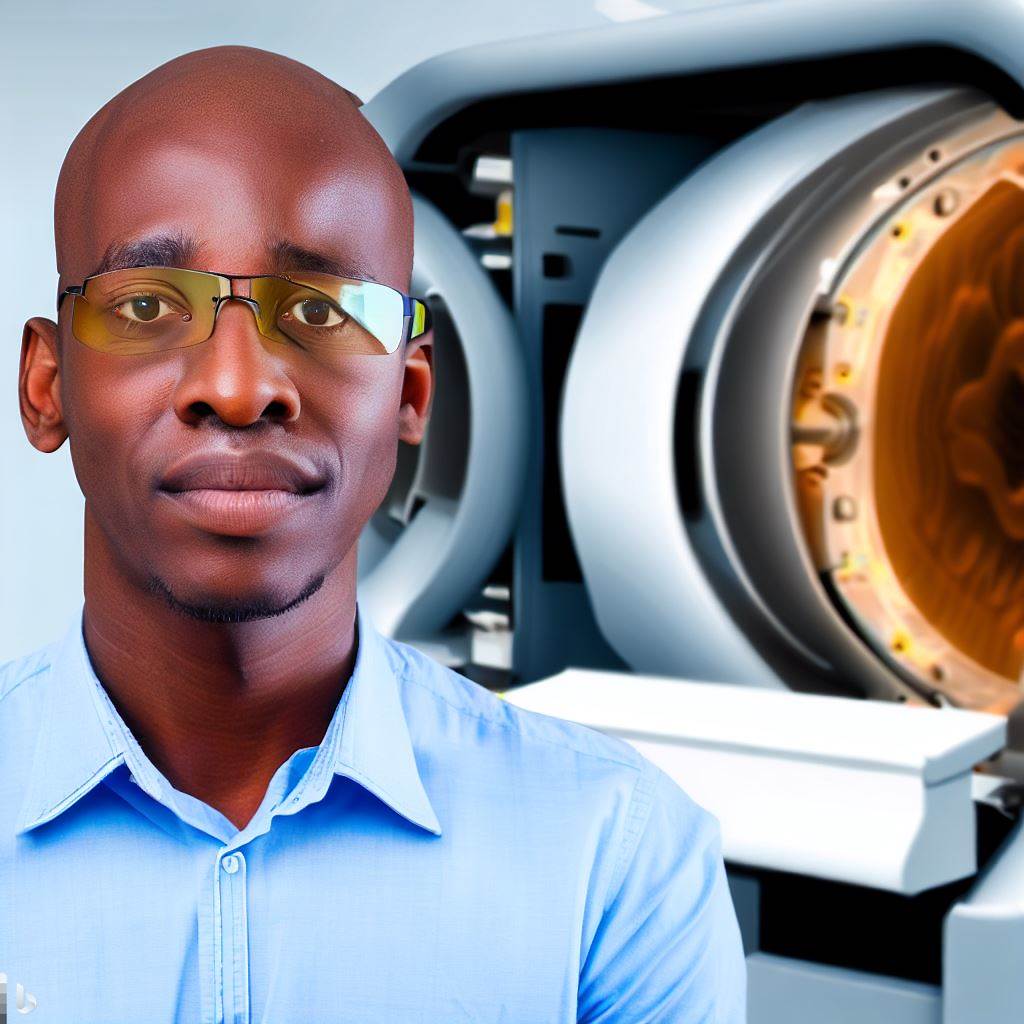Continuing Education Opportunities for MRI Techs in Nigeria
Last Updated on September 25, 2023
Introduction
Continuing education is essential for MRI techs in Nigeria to ensure they stay updated with the latest advancements and provide high-quality healthcare.
While MRI technology is growing in Nigeria, it still faces challenges, particularly in terms of accessibility and the availability of trained professionals.
In this blog post, we delve into the significance of continuous learning for MRI techs, the current state of MRI technology in the country, and the efforts being made to overcome the challenges.
We will explore the critical role of MRI techs in advancing healthcare and improving patient outcomes in Nigeria.
Overview of the Role of MRI Techs in Nigeria
As healthcare facilities continue to advance in Nigeria, the role of MRI Techs has become increasingly vital.
These highly skilled professionals play a crucial part in patient care and diagnostic processes.
In this section, we will explore the responsibilities and duties of MRI Techs in Nigeria, as well as the growing demand for qualified individuals in this field.
Responsibilities and Duties of MRI Techs in Nigeria
- Performing magnetic resonance imaging (MRI) scans on patients using specialized equipment.
- Ensuring the safety, comfort, and well-being of patients throughout the imaging process.
- Operating and maintaining MRI machines to produce high-quality images for diagnosis.
- Preparing patients for scans by providing information and answering their questions.
- Administering contrast agents when necessary to enhance image visibility.
- Monitoring patients during the scanning procedure to ensure accurate results.
- Assisting radiologists and physicians in analyzing and interpreting images for diagnoses.
- Ensuring proper documentation and record-keeping of patient procedures and information.
- Following strict safety protocols to minimize risks associated with MRI scans.
- Continuously updating knowledge and skills through professional development and training.
The responsibilities of MRI Techs in Nigeria encompass not only technical expertise but also a strong commitment to patient welfare and accurate diagnosis.
Demand for Qualified MRI Techs in Healthcare Facilities
The demand for qualified MRI Techs in Nigerian healthcare facilities has been steadily increasing. The growth is driven by several factors, including:
- Rising prevalence of diseases and conditions that require MRI scans for accurate diagnosis.
- Advancements in medical technology and the increasing use of MRI in various medical specialties.
- The need for highly skilled professionals who can operate and maintain MRI machines effectively.
- The importance of accurate and timely diagnosis in improving patient outcomes.
- The expansion of healthcare facilities and the establishment of new hospitals and diagnostic centers.
With the demand for MRI Techs on the rise, healthcare institutions are actively seeking qualified individuals who possess the necessary technical skills and knowledge.
This demand presents promising opportunities for individuals seeking a career in the field of medical imaging in Nigeria.
Basically, the role of MRI Techs in Nigeria is critical in providing accurate diagnoses and improving patient care. Their responsibilities include conducting MRI scans, ensuring patient comfort and safety, and assisting in the analysis of images.
The growing demand for qualified MRI Techs in healthcare facilities is a reflection of the importance placed on accurate diagnosis and the need for skilled professionals in this field. As healthcare in Nigeria continues to evolve, so does the role of MRI Techs, making it an exciting and rewarding career choice.
Read: Essential Skills for Pharmacy Technicians in Nigeria
Challenges Faced by MRI Techs in Nigeria
As MRI Technologists in Nigeria strive to enhance their skills and knowledge, they confront several challenges that hinder their access to continuing education opportunities.
This section will discuss the limited access to such opportunities and explore the lack of funding and resources for their professional development.
Limited Access to Continuing Education Opportunities
- MRI Techs in Nigeria face a significant obstacle in their quest for continuing education due to the limited availability of relevant courses and workshops.
- The country lacks specialized institutions or dedicated programs that offer advanced training for MRI Technologists.
- Most existing educational institutions primarily focus on general medical training rather than specialized fields such as MRI technology.
- Even when some continuing education opportunities are available, they are often geographically constrained, making it difficult for techs from remote areas to access them.
- Furthermore, the high demand for MRI technology and the limited number of qualified trainers create a gap in educational capacity.
Lack of Funding and Resources for Professional Development
- MRI techs in Nigeria also face financial challenges as they strive to pursue continuing education.
- The lack of adequate funding options, scholarships, and grants hampers their ability to enroll in advanced courses or attend workshops.
- Additionally, the cost of acquiring the necessary resources, such as textbooks, specialized software, and reference materials, pose significant financial burdens.
- The scarcity of modern MRI equipment in healthcare facilities limits hands-on training opportunities, thereby impeding professional development.
- The limited availability of research funds and support further constrains the development of MRI Techs in Nigeria.
In essence, MRI Technologists in Nigeria face substantial challenges when it comes to accessing continuing education opportunities.
The limited availability of relevant courses, lack of specialized institutions, and geographical constraints all contribute to this problem. Moreover, the inadequate funding options, lack of resources, and scarcity of modern equipment hinder the professional development of MRI Techs in the country.
It is crucial for the government, healthcare institutions, and professional organizations to recognize and address these challenges to promote the growth and advancement of MRI Techs in Nigeria.
Read: Comparing Pharmacy Technician Schools in Nigeria

Importance of Continuing Education for MRI Techs in Nigeria
In order to provide the best possible patient care, it is crucial for MRI techs in Nigeria to actively engage in continuing education. By constantly updating their knowledge and skills, they can enhance the quality of patient care and stay abreast of the advancements in MRI technology.
Enhancing the Quality of Patient Care
Continuing education plays a vital role in empowering MRI techs to deliver high-quality care to their patients. By participating in ongoing learning opportunities, techs can expand their understanding of imaging techniques, patient safety protocols, and radiation protection measures.
This knowledge allows them to make more accurate diagnoses, effectively assess patient conditions, and provide appropriate treatment recommendations.
Furthermore, continuing education equips MRI techs with the skills and competencies needed to handle complex cases and challenging patient scenarios.
As they stay updated on the latest developments in MRI technology and imaging protocols, they become better equipped to optimize image quality, enhance accuracy, and identify potential abnormalities or pathologies.
This attention to detail can significantly improve patient outcomes and contribute to overall healthcare quality in Nigeria.
Read: The Journey to Becoming a Registered Nurse in Nigeria
Advancements and Updates in MRI Technology
The field of MRI technology is constantly evolving, with new techniques, protocols, and equipment being introduced regularly.
Continuous learning ensures that MRI techs in Nigeria remain knowledgeable about these advancements and updates, enabling them to adapt to changing practices and deliver state-of-the-art care.
One notable advancement is the introduction of specialized MRI sequences and protocols for different anatomical areas and pathologies.
Through continuing education, techs can learn how to utilize these sequences effectively, leading to improved image quality, faster scan times, and increased patient comfort. This, in turn, enhances the diagnostic accuracy and facilitates better clinical decision-making.
Besides, continuing education can also train MRI techs on the latest software and hardware upgrades. Upgraded MRI systems often come with advanced functionalities and automated features that streamline workflow and improve image acquisition.
By staying up to date, techs can make the most of these enhancements, resulting in reduced scan times, increased efficiency, and improved patient throughput.
Continuing education is of paramount importance to MRI techs in Nigeria. It elevates the quality of patient care by providing techs with the necessary knowledge and skills to optimize imaging techniques, ensure patient safety, and make accurate diagnoses.
Moreover, it allows techs to stay updated on advancements in MRI technology, enabling them to adapt to new practices and deliver the best possible care to their patients. By prioritizing ongoing learning, MRI techs in Nigeria can contribute to the overall growth and development of the healthcare system in the country.
Read: Continuing Education for Medical Lab Technicians in Nigeria
Current Continuing Education Opportunities for MRI Techs in Nigeria
In Nigeria, there are various continuing education opportunities available for MRI techs. These programs and workshops aim to enhance their skills and knowledge in the field.
Additionally, there are certifications and professional organizations that support MRI techs in their professional growth.
Overview of existing training programs and workshops available in Nigeria
- West African College of Radiology (WACR): WACR offers a comprehensive training program for MRI techs in Nigeria. This program covers various aspects of MRI technology, including image acquisition, interpretation, and patient care.
It is a well-structured course that equips techs with the necessary skills to excel in their field. - Nigerian Institute of Medical Research (NIMR): NIMR provides workshops and seminars specifically designed for MRI techs. These training sessions focus on the latest advancements in MRI technology, ensuring techs stay up-to-date with the ever-evolving field.
- University Teaching Hospitals (UTHs): Many UTHs in Nigeria offer specialized training programs for MRI techs. These programs provide hands-on experience and theoretical knowledge, allowing techs to develop a strong foundation in MRI technology.
- Private Training Institutions: There are several private training institutions in Nigeria that offer specific courses for MRI techs. These institutions provide flexible schedules and personalized training, catering to the diverse needs of techs.
Read: Step-by-step Guide to Becoming a Nursing Assistant in Nigeria
Description of certifications and professional organizations supporting MRI techs
- Registry for Radiographers in Nigeria (RRN): RRN is a professional body that offers certification for MRI techs. This certification ensures that techs meet the required standards and possess the necessary competencies to practice MRI technology effectively.
- Association of Radiographers of Nigeria (ARN): ARN is a national professional organization that provides support, networking opportunities, and continuing education resources for MRI techs. They organize conferences, workshops, and seminars to enhance the professional growth of techs.
- International Society for Magnetic Resonance in Medicine (ISMRM): ISMRM is a global organization that supports MRI techs through various educational resources, research publications, and networking opportunities. Techs can gain access to the latest research findings and connect with professionals from around the world.
- Radiological Society of Nigeria (RSN): RSN is a professional body that promotes the advancement of radiology in Nigeria. They provide resources, mentorship programs, and continuing education opportunities for MRI techs to enhance their skills and knowledge.
Ultimately, there are several continuing education opportunities for MRI techs in Nigeria. These programs and workshops, offered by institutions such as WACR, NIMR, UTHs, and private training institutions, provide techs with the necessary skills and knowledge to excel in their field.
Additionally, certifications from RRN and support from professional organizations like ARN, ISMRM, and RSN contribute to the professional growth of MRI techs in Nigeria.
Read: Salary Expectations for Pharmacy Technicians in Nigeria
Future Improvements and Expanded Opportunities
Potential solutions for increasing continuing education opportunities for MRI techs in Nigeria
- Establish partnerships with international organizations to offer scholarships and training programs.
- Create a centralized database for MRI techs to access resources and information on continuing education opportunities.
- Introduce government-funded initiatives to provide financial support for MRI techs pursuing advanced certifications or attending conferences.
- Collaborate with universities and research institutions to offer specialized courses and workshops for MRI techs.
- Encourage professional associations to organize regular conferences and symposiums for knowledge sharing and skill enhancement.
- Develop online platforms and webinars to provide virtual learning opportunities for MRI techs across the country.
Steps that can be taken to improve the overall professional development of MRI techs in Nigeria
- Establish standardized competency frameworks and guidelines for MRI techs to ensure consistent skill development.
- Facilitate mentorship programs where experienced MRI techs can guide and support junior colleagues.
- Promote interdisciplinary collaboration, allowing MRI techs to work alongside other healthcare professionals for continuous learning.
- Encourage participation in research and publication activities to foster innovation and contribute to the field.
- Advocate for improved working conditions and recognition of the importance of MRI techs in the healthcare system.
- Facilitate career advancement opportunities by offering leadership training and management courses for MRI techs.
Overall, with the implementation of these future improvements and expanded opportunities, MRI techs in Nigeria can enhance their professional development, knowledge, and skills.
Read: Top Institutions to Study Phlebotomy in Nigeria
Conclusion
Continuing education is crucial for MRI techs in Nigeria as it enables them to stay updated with the latest advancements in their field. It allows them to enhance their skills and knowledge, which in turn improves the quality of healthcare services they provide.
By having access to expanded educational opportunities, MRI techs in Nigeria can contribute to the overall improvement of healthcare in the country. They can offer more accurate diagnoses, better patient care, and assist in the development of new treatment methods.
Furthermore, continuing education allows MRI techs to keep up with the ever-evolving technology in the field. This ensures that they can effectively utilize the latest MRI equipment and techniques, improving the accuracy and efficiency of their work.
On a final note, ongoing education for MRI techs in Nigeria is of utmost importance. It not only benefits individual professionals but also has a significant impact on the healthcare system as a whole.
By investing in continuing education, Nigeria can strive for better healthcare outcomes and ultimately improve the well-being of its population.


